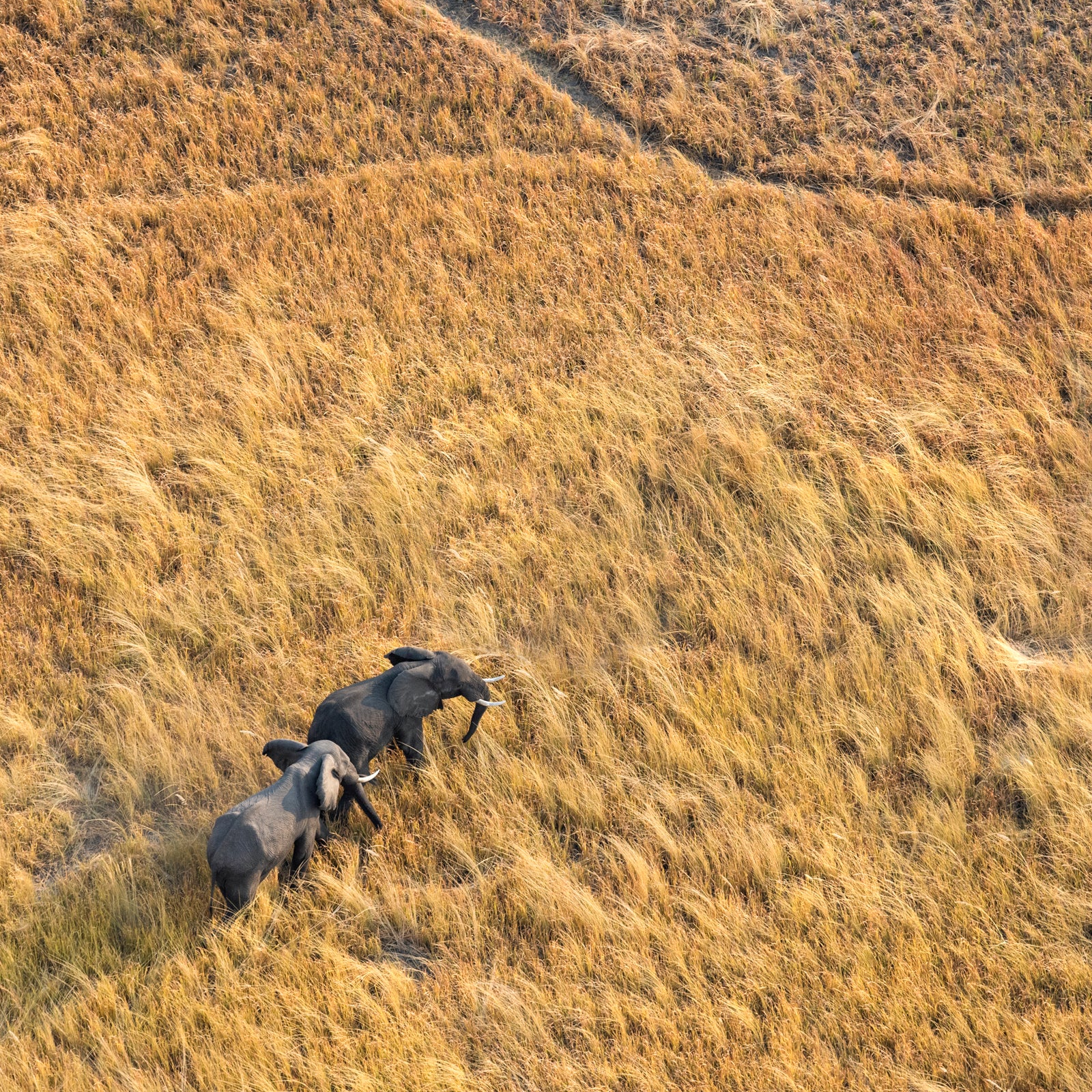Stanza Mbanga Molaodi had big plans this spring. On May 17, the owner of ������ Botswana was due to accompany six Italian clients into Chobe National Park, home to a third of the continent’s 600,000 elephants. From its base camp in the bush, the group would go on game drives, day-trip to Victoria Falls, and enjoy cocktails and crocodile-watching��on sunset cruises up the Chobe River. The gang would then relocate to the park’s semiarid Savuti region, a landscape of baobab trees and rocky outcrops��where dense herds of zebra and buffalo congregate at watering holes and try not to get picked off by the Savuti lion��pride. Next up would be the Khwai Community Area, where indigenous bushmen would guide the Italians on walking safaris and take them paddling down the Khwai River in traditional mokoro canoes. The 12-day adventure would end with a birding extravaganza in the Okavango Delta, a Unesco��World Heritage site. “It’s a beautiful place to end a safari,” Molaodi told me, sounding almost emotional.
But the trip was not to be.
Frightened��by the coronavirus, the Italians canceled. All of Molaodi’s clients��have canceled or postponed. When I reached him by phone recently, he was holed up at home with his family in Kasane, fretting. On the day we spoke, the Botswana Defense Force ordered all troops on leave or off duty to return to their posts immediately, and Molaodi predicted a military-enforced lockdown, not unlike what neighboring South Africa had announced that same day. Molaodi seemed to be speaking for Africa’s entire��$40 billion wildlife-tourism industry when he confessed, “We are all retrenching. Everyone is panicked.”��
Simply put, the safari business in Africa and Asia has stopped. Completely. Maybe that’s not surprising at this point in the pandemic. Between flight cancelations, national lockdowns, border closures, emergency visa restrictions, and required quarantine upon entry, clients fearless enough to travel couldn’t reach their destinations if they wanted to. Even if they could, in some countries they’d be sorely disappointed. India has shuttered all of its tiger reserves and national parks. Congo has closed Virunga National Park, fearing that its famous mountain gorillas could contract COVID-19��from humans. Gabon, deeply scarred from losing 15,000 lowland gorillas in a 1995 Ebola outbreak, has likewise halted all ape tours.��
“Poaching will increase,” De Sibi insists. “People who are jobless must find money or food.”
What is surprising are the domino effects of this economic catastrophe and the ultimate impact they will have on wildlife. Starting in April, Molaodi’s six staff members will receive half their normal salary, but for May and beyond, all bets are off. Roberto de Sibi, owner of Savannah Explorers in Tanzania, had already placed 17 of his 45 employees on half salary when we spoke (I found him under 14-day quarantine in Milan, where he’d fled to be near his 82-year-old father, having caught the last flight from Tanzania to Italy). Neither Molaodi nor De��Sibi��would be paying anything to the many freelance��drivers and guides they hire during busy periods. Molaodi wouldn’t be paying the bushmen to take clients paddling, and De Sibi wouldn’t be paying Dadoga tribesmen to show his clients how to melt metal to make knives. Their clients wouldn’t be donating solar lanterns to villages or otherwise leaving generous contributions.��
Crucially, neither operator would be ponying up the various fees required by parks and community conservation areas for tourist entry, guide entry, vehicle entry, and overnight stays. Large percentages of such fees go to local communities for development projects and conservation measures, like funding anti-poaching scouts. Ninety percent of Zambia’s more than 1,000 scouts come from its communities and are paid from tourism fees. In Namibia, tourism fees pay for the country’s 600 game guards and support more than 6,000 families.��
With rampant unemployment, unpaid game guards, and fewer tourists in the bush to report suspicious activity, it’s just a matter of time before wildlife gets hammered. “Poaching will increase,” De Sibi������sists. “People who are jobless must find money or food.”��
Everyone I spoke with concurred on this point. “One of the biggest fears is that, if scouts can’t be paid, I can foresee people poaching,” says Maxi Louis, director of the Namibian Association of��Community Based Natural Resources Management Support Organizations. “Poverty will drive people.” Louis also anticipates that local tolerance for crop-raiding herbivores and livestock-killing predators, both common in villages near protected areas, will plummet. “There will be no scouts to manage human-animal conflict��and no funds to compensate for lost livestock,” she says, expecting a spike in retaliatory killings��of troublesome wildlife.
In a 2012 study, ecologist Ralf Buckley of��Griffith University in Australia found that most of the more than 1,400 species listed as threatened by the International Union for��Conservation of Nature depend on tourism for their survival, including iconic species like lions, elephants, and rhinos. “Many park��agencies worldwide now rely heavily on tourism for routine operational funding, more than 50 percent in some cases,” the study reported. “This puts rare mammals at a new risk, from downturns in tourism driven by external socioeconomic factors.”��
Given the magnitude of this potential biodiversity implosion, mentioning a silver lining might seem frivolous. But there is one. Tourism is a double-edged sword. It funds conservation, yes, but too much of it can disturb breeding patterns, feeding habits, and migratory movement. It can pollute landscapes and destroy habitat. “This travel hiatus of several months will give a chance for resilient natural environments to recover from the stress inflicted by tourism,” says Frederic Dimanche, director of the Ted Rogers School of Hospitality and Tourism Management at Ryerson University in Toronto. (While Dimanche’s prediction is warranted, many other��reports on social media of wildlife thriving as a result of quarantines .) If the animals can manage to survive, the pandemic might be an opportunity to improve wildlife tourism. “Destinations and tourism operators everywhere have a unique chance to restart a tourism that will be better planned, better managed, one that will be sustainable, with stronger policies,” Dimanche says.��


